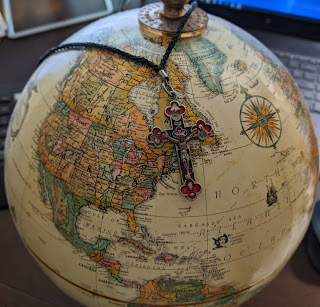Dear Christian Friends,
It's easy to complain about the culture, but if we look closely into the mirror, we see one of the main contributors to the troubles where we live, move, and have our being:
ourselves. It is easy of course to cast blame, but if we must do it, then we ought always begin with the person in our reflection. In every-day life it is easy to point out what
that person did on the road, or what
this other person did in the grocery store, or how uncouth
another was at the dinner party. The blunders and offenses seem obvious to us, but then how often are
we the ones not paying attention -- just not thinking while being distracted -- and oblivious when the traffic light changes; or when we hold up the line unprepared to conduct the transaction, or having had a little too much to drink while being sloppy with appropriate boundaries at that party? It is the easiest thing in the world to criticize, and then we are
that person!
Why are we
that person? St. Paul: "For I do not understand my own actions. For I do not do what I want, but I do the very thing I hate" (Romans 7:15). You see, we carry with us this carcass of the old sinner around our necks. We rise up in the morning confessing it and drowning it once again that we might walk with God this new day, but at every turn, that nasty self is trying to break out from the grave to once again invade our lives.
The Christian faith knows this as the conflict or the battle. Every Christian -- if they're being honest -- knows exactly what I'm talking about. And this is the duality discussed in chapter 7 of
Faith That Sees Through the Culture. On page 112 I offer these insights:
1. The conflict itself is not an indication that a Christian is not really a Christian. Much to the contrary, the conflict is a crucial sign that a Christian is truly a Christian.
2. The conflict, however, is not the Christian's focus, as if the conflict were a badge to take pride in or a suffering that
makes them real Christians. Rather, its real purpose is to lead Christians back to Christ, their true focus.
3. The conflict is surpassed by an even more important experience, namely, the Christian's life in the Spirit -- the daily remaining in Christ -- which leads to living in faith and the active expression of that faith, especially love, which is the ongoing work of the Holy Spirit.
The conflict is used by God to bring us back to Him on a daily basis; it is blessed reminder -- in-spite of its real unpleasantness -- that we can't go it alone; that we mustn't take our faith for granted. There is only One who can keep us alive in faith, hope, and love: The Lord! The conflict slaps us daily to wake up to see that we must call on the Lord to save us from the mess we're in... that begins with ourselves.
If this offends you, then don't waste your time with the Christian faith. Evidently, you don't need it, because it is just
everyone else who messes up. The saving faith is only for those needing salvation. It is only for sinners...for those who know the conflict...and for those who rejoice in Christ all the more, because His forgiveness is constantly given, daily affirmed, and perpetually received. We know it through the conflict. Just remember that conflict itself is not our preoccupation, but rather the Lord Jesus we hold to!
We've entered Holy Week! Day 1 -- Palm Sunday -- saw Christ riding triumphantly into Jerusalem. He rode in to save us from sin and death. Day 2 "Holy Monday," is the day Jesus cleansed the temple: tables were overturned, His whip chased away those dishonoring God in the holy court. Jesus was angry...and full of love. He was getting our attention: we need to wake up about how we are treating His new Temple: His Church on earth, and the individual members of that Temple (those with mini temples called "our bodies"). We need to make the most of our conflict, so that we look to Jesus who has ridden into our lives and is desirous -- always -- of cleansing our temples that we might live for God.
We are also in the midst of the coronavirus, a terrible thing that is causing great anxiety, fear, and is bringing many to the portal of life's end. Yet, the LORD is still at work. He desires that His people delivered from any condemnation their conflict might have resulted in, might respond to Him by helping others during this time. His people are permitted to be little Christs, God's lights during this time; and people full of hope. Practicing all that must be practiced to properly care for our neighbor: whether it is proper isolation and distancing, the avoidance of hording, or being vigilant against a lax attentiveness that would miss the neighbor close by to encourage them during this stressful time. Such conscientious comes when people know much
they have been helped by God...always helped in the daily conflict...and want to give back; who want to respond to God's love by loving God back. Knowing at the same time that to love God back requires love towards the neighbor -- sinners like us -- and since the LORD has loved and loves us...we love. It's just that simple from those who have been saved by Christ; from those who daily rise above the conflict by holding to Jesus, the Author and Perfector of their faith.
In Your Service and To Christ's Glory,
Rev. Dr. Alfonso Espinosa
